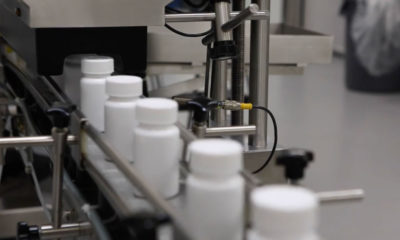It’s no secret that health experts and nutritionists have been wary of high fructose corn syrup for years. But now they have one more reason to advocate against it: a new study published in the journal Science says that the sugary substance boosts the growth of cancerous tumors in mice.
The study, conducted by researchers at Cornell University and Baylor University, found that consuming a modest amount of high-fructose corn syrup every day—about the equivalent of drinking one can of soda—can accelerate the growth of cancerous tumors in mice’s intestines.
As part of the research trial, scientists generated mice with early-stage colon cancer. Then, the scientists gave the mice a moderate amount of sweetened water, with 25% high fructose corn syrup, each day. The amount was a modest amount, meant to mimic a human’s daily consumption of one can of sugary soda. After two months, the mice developed tumors that were higher-grade and larger in size than those mice treated with only water.
Scientists say that the results suggest that even moderate amounts of high fructose corn syrup can boost the growth of early-stage tumors in the intestines. Early stage tumors can occur in young adult humans without notice, but it typically takes 20-30 years for those small, benign tumors to develop into aggressive cancer. Although further studies are necessary to determine how these findings would translate to the human body, the scientists’ ultimate findings suggest that chronic consumption of high fructose corn syrup can shorten the time it takes for intestinal cancer to develop.
High fructose corn syrup has been around—and in our food—for years. The sweeter is commonly found in processed foods like candies and soda, but over the years it has found more and more ways to creep into Americans’ meals.
As the prevalence of high fructose corn syrup has grown, so too have our waistlines. The obesity rate of America is increasing, alongside high blood pressure issues and weight-related diseases like type-2 diabetes. There have been numerous studies showing the link between consuming sugary drinks and other foods with high fructose corn syrup, and therefore the scientific and medical community’s thought on the substance was focused on its effect on obesity and obesity-related diseases.
Doctors were also aware that obesity, in turn, increases the risk of many types of cancer, such as colon cancer. But this study takes the warnings to a new level, establishing a direct causal link between the consumption of high fructose corn syrup and cancer. Researchers believe that these results may explain the correlation between an increased consumption of sugary drinks and other high-sugar processed foods over the last 30 years with an increase in colorectal cancers in adults.
But the study isn’t all bad news: it also discovered the biological mechanism that helped caused the cancerous growth enhanced by the high fructose corn syrup. The researchers focused on two enzymes: KHK, an enzyme used to metabolize fructose, and FASN, which helps the body synthesize fatty acids. Mice in the study that lacked either of these two particular enzymes did not develop larger tumors, even when fed the same amounts of high fructose corn syrup.
This discovery could help researchers and doctors better understand how cancers develop and lead to new treatments, by focusing on cancer therapies targeting the metabolism of fructose through these two
enzymes.
Additional studies, particularly those focusing on the impact on the human body, will certainly follow. But in the meantime, health experts say this is just one more reason to cut out high fructose corn syrup from your diet.























